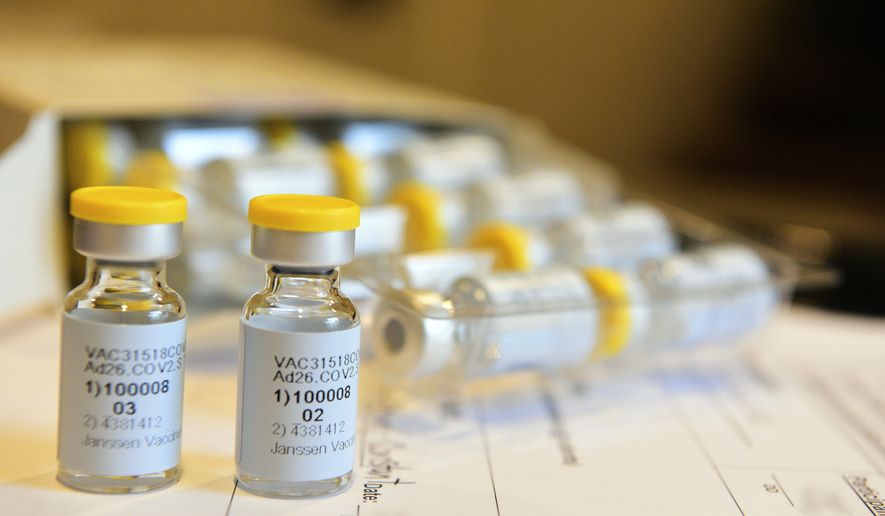Pharmaceutical giant Johnson & Johnson started a massive human trial of its coronavirus vaccine Wednesday, lining up another option as federal officials told Congress they will resist political pressure ahead of an unprecedented push to inoculate the country.
The Janssen Pharmaceutical Companies of J&J said it plans to enroll up to 60,000 adults at nearly 215 clinical research sites in the U.S. and abroad. The company said its vaccine candidate offers twin advantages over some of its competitors — it can be delivered in a single dose and doesn’t require unusually cold storage temperatures.
The Trump administration, through “Operation Warp Speed,” is supporting private drugmakers as it tries to lock down a successful vaccine before the end of the year.
Three companies — AstraZeneca, Pfizer and Moderna — began their phase 3 trials weeks ago and expect to receive data on whether their candidates are effective as soon as late October.
President Trump said he’s encouraged by the record pace of development.
“We encourage Americans to enroll in the vaccine trial,” Mr. Trump said of J&J. “It is not only interesting, it will be a terrific thing for our country.”
Mr. Trump also said he’s distributed $200 million in CARES Act so that states can distribute an eventual vaccine immediately.
“We want to do that the instant it is approved,” Mr. Trump said.
Many view a vaccine as the most critical tool in getting life back to normal. The coronavirus pandemic that began in Wuhan, China, in December, has devastated economies and killed nearly 1 million worldwide, including more than 200,000 in the U.S.
Critics of the Trump administration fear the president will force the Food and Drug Administration to approve a vaccine for emergency use before Election Day, before it is fully vetted.
FDA Commissioner Stephen Hahn rejected those claims in Senate testimony Wednesday.
“In the end, FDA will not authorize or approve a vaccine that we would not feel comfortable giving to our families,” he told the Senate Health, Education, Labor and Pensions Committee.
He said science will guide the agency’s decisions and the “FDA will not permit any pressure from anyone to change that.”
Later Wednesday, the president chafed at reports the FDA might beef up its standard for approving a vaccine for emergency authorization use, or EUA, to make sure the public has confidence in its review.
“That sounds like a political move,” Mr. Trump said. “I’m saying why would they have to be adding great length to the process?”
The president said he trusts companies to do rigorous testing in conjunction with government support.
“I don’t see any reason why it should be delayed further,” Mr. Trump said.
Senators heard from top officials one day after the U.S. death toll reached 200,000, meaning the country accounts for roughly 4% of the world’s population but a fifth of global deaths from the disease.
More than 90% of the American population remains susceptible to the coronavirus, based on antibody testing, though it varies widely from place to place, Robert Redfield, the director of the Centers for Disease Control and Prevention, told the committee.
But a White House adviser, Scott Atlas, undercut the director hours later, saying the share is likely higher than 90%.
He said some people might have cross-immunity from other infections and “T-cell immunity” and boosts the number, marking another instance in which administration officials were unable to agree as Americans seek reliable information on the pandemic.
“You’re supposed to believe the science and I’m telling you the science,” Mr. Atlas said.
Mr. Trump said it will be important for Americans to get their flu shot to avoid a troublesome fall, when doctors will have to distinguish between influenza and COVID-19.
“It’s going to be a very interesting time,” he said.
As the nation scrambles to mitigate the pandemic, federal officials are banking on a pharmaceutical path to widespread immunity.
The White House is outlining distribution plans for the vaccines that emerge from trials, even though the FDA hasn’t approved any of the candidates.
Officials plan to have 100 million doses ready by the end of the year and shots available to every American who wants one by April.
J&J is starting its phase 3 trial roughly two to three months after its competitors. Yet while other vaccines require two doses, “this a potent vaccine in a single dose,” said Paul Stoffels, chief scientific officer at J&J.
It’s also an adenovirus serotype 26 (Ad26) vector-based vaccine that is stored at 2-to-8 degrees Celsius, offering a simpler “cold-chain” than messenger-RNA candidates that must be stored at -80 degrees.
Federal officials told Congress they will ensure the cold chain is operable for whichever vaccines make it to market.
• Tom Howell Jr. can be reached at thowell@washingtontimes.com.




Please read our comment policy before commenting.